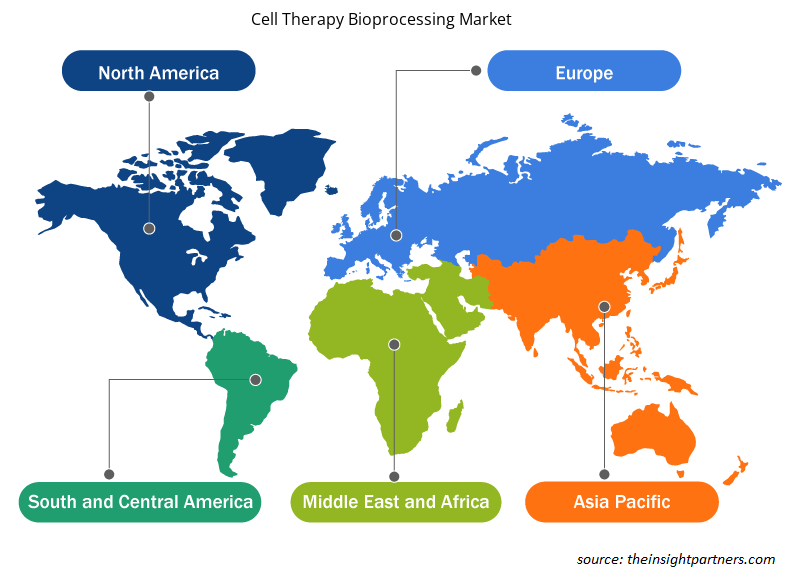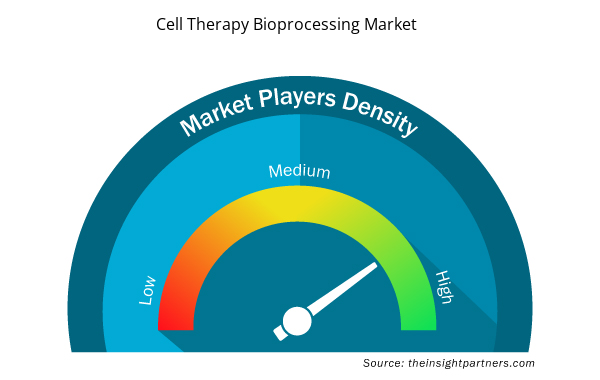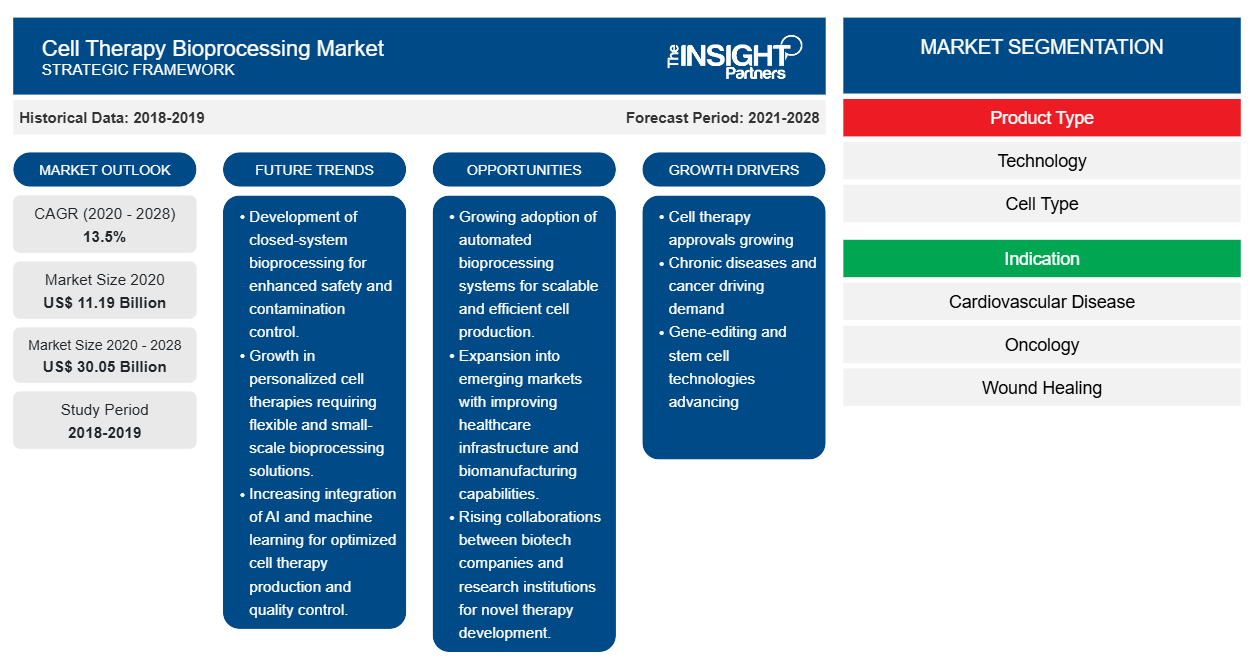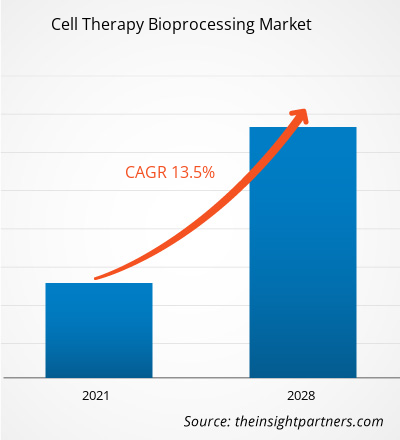細胞治療バイオプロセスは、2020年の111億9,250万米ドルから2028年には300億5,261万米ドルに達すると予想されています。市場は2021年から2028年にかけて13.5%のCAGRで成長すると予測されています。bioprocessing is expected to reach US$ 30,052.61 million in 2028 from US$ 11,192.50 million in 2020. The market is estimated to grow with a CAGR of 13.5% from 2021-2028.
細胞療法バイオプロセス市場は、技術、細胞の種類、エンドユーザー、地域に基づいて分析されています。地域に基づく市場は、北米、ヨーロッパ、アジア太平洋、中東およびアフリカ、南米および中米に分割されています。レポートでは、市場動向、技術の進歩、市場動向、大手企業の競争環境分析などのパラメータに重点を置いて、細胞療法バイオプロセス市場の洞察と詳細な分析を提供しています。また、すべての主要地域の市場全体でのCOVID-19パンデミックの分析も含まれています。
要件に合わせてレポートをカスタマイズする
このレポートの一部、国レベルの分析、Excelデータパックなど、あらゆるレポートを無料でカスタマイズできます。また、スタートアップや大学向けのお得なオファーや割引もご利用いただけます。
- このレポートの主要な市場動向を入手してください。この無料サンプルには、市場動向から見積もりや予測に至るまでのデータ分析が含まれます。
市場分析
細胞療法の承認増加
細胞療法は、再生医療や個別化医療を提供することで、希少遺伝性疾患を含むさまざまな慢性疾患の治療に良い結果を示しています。慢性疾患の治療に対するニーズが高まるにつれて、研究開発活動が促進され、細胞療法の生産と製品承認が増加しています。以下に、細胞療法バイオプロセス市場の成長に貢献した細胞療法の承認の例をいくつか挙げます。bioprocessing market.
- 2019年5月、米国食品医薬品局(FDA)は、ノバルティスAGの子会社であるAveXis社が製造するゾルゲンサを承認しました。ゾルゲンサは、2歳未満の小児の脊髄性筋萎縮症の治療を目的としており、静脈に1回注入して投与されます。Zolgensma, manufactured by AveXis, Inc. A subsidiary of Novartis AG. Zolgensa is designed to treat spinal muscular atrophy in children below two years and is given by infusing one-time into the vein.
- 2020年7月、ギリアド社の子会社であるKite Pharma, Inc.は、TecartusのFDA承認を取得しました。Tecartusは、成人の難治性マントル細胞リンパ腫(MCL)の治療を目的とした(CAR)T細胞療法です。ギリアド社によると、Tecartusはマントル細胞リンパ腫に対する初の承認済み(CAR)T細胞療法であり、マントル細胞リンパ腫の治療における新たな境地となることが期待されています。
- 2021年2月、ブリストル・マイヤーズスクイブ社の子会社であるジュノ・セラピューティクス社が、Breyanziの承認を取得しました。Breyanziは、成人の特定の種類の大細胞型B細胞リンパ腫の治療を目的とした細胞ベースの遺伝子治療薬です。この治療は、患者が少なくとも2種類の他の全身治療に反応しなかった場合に行われます。しかし、Breyanziは2019年に最初の申請以来、規制上の挫折に直面しており、現在は欧州医薬品庁の審査中であり、2020年7月に承認されました。Breyanzi. Breyanzi is a cell-based gene therapy intended to treat certain types of large B-cell lymphoma in adults. The treatment is given after patient have not responded to minimum two other types of systemic treatment. However, Breyanzi in 2019, faced regulatory setback since its first filing; it is currently under the European Medicines Agency’s review and was validated in July 2020.
このように、製品開発の増加は、細胞療法の増加を反映したさまざまな製品の承認をもたらしました。したがって、細胞療法の承認の増加により、細胞療法のバイオプロセスが大幅に増加し、今後数年間で市場の成長を促進することが予想されます。bioprocessing, which, in turn is likely to drive the market’s growth over the coming years
テクノロジーに基づく洞察
細胞療法バイオプロセス市場は、技術別に、バイオリアクター、凍結乾燥、電気紡糸、制御流遠心分離、超音波溶解、ゲノム編集技術、細胞不死化技術、およびウイルスベクター技術に分類されます。バイオリアクターセグメントは2020年に市場で最大のシェアを占めましたが、ゲノム編集技術セグメントは予測期間中に市場で最も高いCAGR 14.5%を記録すると予想されています。bioprocessing market, by technology, is segmented into bioreactor, lyophilization, electro spinning, controlflow centrifugation, ultrasonic lysis, genome editing technology, cell immortalization technology, and viral vector technology. The Bioreactor segment held the largest share of the market in 2020, whereas the genome editing technology segment is anticipated to register the highest CAGR of 14.5% in the market during the forecast period.
細胞タイプに基づく洞察
細胞療法バイオプロセス市場は、細胞の種類別に、幹細胞、免疫細胞、ヒト胚性幹細胞、多能性幹細胞、造血幹細胞に分類されます。幹細胞セグメントは2020年に市場で最大のシェアを占めましたが、予測期間中、同じセグメントは市場で14.0%という最高のCAGRを記録すると予想されています。
エンドユーザーベースの洞察
細胞療法バイオプロセス市場は、適応症別に、心血管疾患(CVD)、腫瘍学、創傷治癒、整形外科、その他に分類されています。腫瘍学セグメントは2020年に市場で最大のシェアを占め、整形外科セグメントは予測期間中に市場で最も高いCAGR 14.3%を記録すると予想されています。
細胞治療バイオプロセス市場で事業を展開する企業は、製品の発売や拡張などの有機的な戦略を採用して、世界中で事業展開と製品ポートフォリオを拡大し、高まる需要に対応しています。
細胞治療バイオプロセス市場の地域別洞察
予測期間を通じて細胞療法バイオプロセス市場に影響を与える地域的な傾向と要因は、Insight Partners のアナリストによって徹底的に説明されています。このセクションでは、北米、ヨーロッパ、アジア太平洋、中東、アフリカ、南米、中米にわたる細胞療法バイオプロセス市場のセグメントと地域についても説明します。

- 細胞治療バイオプロセス市場の地域別データを入手
細胞治療バイオプロセス市場レポートの範囲
| レポート属性 | 詳細 |
|---|---|
| 2020年の市場規模 | 111億9千万米ドル |
| 2028年までの市場規模 | 300.5億米ドル |
| 世界のCAGR(2020年 - 2028年) | 13.5% |
| 履歴データ | 2018-2019 |
| 予測期間 | 2021-2028 |
| 対象セグメント | 製品タイプ別
|
| 対象地域と国 | 北米
|
| 市場リーダーと主要企業プロフィール |
|
細胞療法バイオプロセス市場のプレーヤー密度:ビジネスダイナミクスへの影響を理解する
細胞療法バイオプロセス市場は、消費者の嗜好の変化、技術の進歩、製品の利点に対する認識の高まりなどの要因により、エンドユーザーの需要が高まり、急速に成長しています。需要が高まるにつれて、企業は提供を拡大し、消費者のニーズを満たすために革新し、新たなトレンドを活用し、市場の成長をさらに促進しています。
市場プレーヤー密度とは、特定の市場または業界内で活動している企業または会社の分布を指します。これは、特定の市場スペースに、その規模または総市場価値と比較して、どれだけの競合相手 (市場プレーヤー) が存在するかを示します。
細胞治療バイオプロセシング市場で事業を展開している主要企業は次のとおりです。
- フレゼニウスカビAG
- 旭化成株式会社
- ザルトリウスAG
- メルク
- サーモフィッシャーサイエンティフィック株式会社
免責事項:上記の企業は、特定の順序でランク付けされていません。

- 細胞療法バイオプロセシング市場のトップキープレーヤーの概要を入手
テクノロジー別
- バイオリアクター
- 凍結乾燥
- 電界紡糸
- 制御流遠心分離
- 超音波溶解
- ゲノム編集技術
- 細胞不死化技術
- ウイルスベクター技術
細胞の種類別
- 幹細胞
- 免疫細胞
- ヒト胚性幹細胞
- 多能性幹細胞
- 造血幹細胞
適応症別
- 心血管疾患(CVD)
- 腫瘍学
- 傷の治癒
- 整形外科
- その他
エンドユーザー別
- 病院と診療所
- 診断センター
- 再生医療センター
- 学術研究機関
地理別
北米
- 私たち
- カナダ
- メキシコ
ヨーロッパ
- フランス
- ドイツ
- イタリア
- 英国
- スペイン
- その他のヨーロッパ
アジア太平洋(APAC)
- 中国
- インド
- 韓国
- 日本
- オーストラリア
- その他のアジア太平洋地域
中東およびアフリカ(MEA)
- 南アフリカ
- サウジアラビア
- アラブ首長国連邦
- MEAの残り
南米と中米(詐欺)
- ブラジル
- アルゼンチン
- 残りの詐欺
企業プロフィール
- フレゼニウスカビAG
- 旭化成株式会社
- ザルトリウスAG
- メルク
- サーモフィッシャーサイエンティフィック株式会社
- コーニング株式会社
- シティバ
- ロンザ
- レプリゲン
- キャタレント株式会社
- 過去2年間の分析、基準年、CAGRによる予測(7年間)
- PEST分析とSWOT分析
- 市場規模価値/数量 - 世界、地域、国
- 業界と競争環境
- Excel データセット


- Adaptive Traffic Control System Market
- Hair Wig Market
- Frozen Potato Market
- Online Exam Proctoring Market
- Smart Parking Market
- Environmental Consulting Service Market
- Industrial Inkjet Printers Market
- Clinical Trial Supplies Market
- Single-Use Negative Pressure Wound Therapy Devices Market
- Workwear Market

Report Coverage
Revenue forecast, Company Analysis, Industry landscape, Growth factors, and Trends

Segment Covered
This text is related
to segments covered.

Regional Scope
North America, Europe, Asia Pacific, Middle East & Africa, South & Central America

Country Scope
This text is related
to country scope.
よくある質問
The costs of the Cell Therapy Bioprocessing are much higher, and they may cost US$ 50,000–100,000, or more, per cell therapy. The cost may also differ from product to product types.
Key factors driving the growth of the market are increasing investments for cell and gene therapy manufacturing, and growing approvals for cell therapies are the major factors driving the market growth. However, challenges such as high cost of product, regulatory challenges, and logistics challenges are likely to hinder the growth of the cell therapy bioprocessing market.
Cell therapy bioprocessing is a subfield of bioprocess engineering that bridges cell therapy and bioprocessing (i.e., biopharmaceutical manufacturing). Cell therapy is one of the fastest-growing areas of the life sciences. It entails delivering entire living cells to a patient to treat disease.
Trends and growth analysis reports related to Life Sciences : READ MORE..
The List of Companies - Cell Therapy Bioprocessing Market
- Fresenius Kabi AG
- Asahi Kasei Corporation
- Sartorius AG
- MERCK KGaA
- THERMO FISHER SCIENTIFIC INC.
- Corning Incorporated
- Cytiva
- Lonza
- Repligen
- Catalent Inc
The Insight Partners performs research in 4 major stages: Data Collection & Secondary Research, Primary Research, Data Analysis and Data Triangulation & Final Review.
- Data Collection and Secondary Research:
As a market research and consulting firm operating from a decade, we have published and advised several client across the globe. First step for any study will start with an assessment of currently available data and insights from existing reports. Further, historical and current market information is collected from Investor Presentations, Annual Reports, SEC Filings, etc., and other information related to company’s performance and market positioning are gathered from Paid Databases (Factiva, Hoovers, and Reuters) and various other publications available in public domain.
Several associations trade associates, technical forums, institutes, societies and organization are accessed to gain technical as well as market related insights through their publications such as research papers, blogs and press releases related to the studies are referred to get cues about the market. Further, white papers, journals, magazines, and other news articles published in last 3 years are scrutinized and analyzed to understand the current market trends.
- Primary Research:
The primarily interview analysis comprise of data obtained from industry participants interview and answers to survey questions gathered by in-house primary team.
For primary research, interviews are conducted with industry experts/CEOs/Marketing Managers/VPs/Subject Matter Experts from both demand and supply side to get a 360-degree view of the market. The primary team conducts several interviews based on the complexity of the markets to understand the various market trends and dynamics which makes research more credible and precise.
A typical research interview fulfils the following functions:
- Provides first-hand information on the market size, market trends, growth trends, competitive landscape, and outlook
- Validates and strengthens in-house secondary research findings
- Develops the analysis team’s expertise and market understanding
Primary research involves email interactions and telephone interviews for each market, category, segment, and sub-segment across geographies. The participants who typically take part in such a process include, but are not limited to:
- Industry participants: VPs, business development managers, market intelligence managers and national sales managers
- Outside experts: Valuation experts, research analysts and key opinion leaders specializing in the electronics and semiconductor industry.
Below is the breakup of our primary respondents by company, designation, and region:

Once we receive the confirmation from primary research sources or primary respondents, we finalize the base year market estimation and forecast the data as per the macroeconomic and microeconomic factors assessed during data collection.
- Data Analysis:
Once data is validated through both secondary as well as primary respondents, we finalize the market estimations by hypothesis formulation and factor analysis at regional and country level.
- Macro-Economic Factor Analysis:
We analyse macroeconomic indicators such the gross domestic product (GDP), increase in the demand for goods and services across industries, technological advancement, regional economic growth, governmental policies, the influence of COVID-19, PEST analysis, and other aspects. This analysis aids in setting benchmarks for various nations/regions and approximating market splits. Additionally, the general trend of the aforementioned components aid in determining the market's development possibilities.
- Country Level Data:
Various factors that are especially aligned to the country are taken into account to determine the market size for a certain area and country, including the presence of vendors, such as headquarters and offices, the country's GDP, demand patterns, and industry growth. To comprehend the market dynamics for the nation, a number of growth variables, inhibitors, application areas, and current market trends are researched. The aforementioned elements aid in determining the country's overall market's growth potential.
- Company Profile:
The “Table of Contents” is formulated by listing and analyzing more than 25 - 30 companies operating in the market ecosystem across geographies. However, we profile only 10 companies as a standard practice in our syndicate reports. These 10 companies comprise leading, emerging, and regional players. Nonetheless, our analysis is not restricted to the 10 listed companies, we also analyze other companies present in the market to develop a holistic view and understand the prevailing trends. The “Company Profiles” section in the report covers key facts, business description, products & services, financial information, SWOT analysis, and key developments. The financial information presented is extracted from the annual reports and official documents of the publicly listed companies. Upon collecting the information for the sections of respective companies, we verify them via various primary sources and then compile the data in respective company profiles. The company level information helps us in deriving the base number as well as in forecasting the market size.
- Developing Base Number:
Aggregation of sales statistics (2020-2022) and macro-economic factor, and other secondary and primary research insights are utilized to arrive at base number and related market shares for 2022. The data gaps are identified in this step and relevant market data is analyzed, collected from paid primary interviews or databases. On finalizing the base year market size, forecasts are developed on the basis of macro-economic, industry and market growth factors and company level analysis.
- Data Triangulation and Final Review:
The market findings and base year market size calculations are validated from supply as well as demand side. Demand side validations are based on macro-economic factor analysis and benchmarks for respective regions and countries. In case of supply side validations, revenues of major companies are estimated (in case not available) based on industry benchmark, approximate number of employees, product portfolio, and primary interviews revenues are gathered. Further revenue from target product/service segment is assessed to avoid overshooting of market statistics. In case of heavy deviations between supply and demand side values, all thes steps are repeated to achieve synchronization.
We follow an iterative model, wherein we share our research findings with Subject Matter Experts (SME’s) and Key Opinion Leaders (KOLs) until consensus view of the market is not formulated – this model negates any drastic deviation in the opinions of experts. Only validated and universally acceptable research findings are quoted in our reports.
We have important check points that we use to validate our research findings – which we call – data triangulation, where we validate the information, we generate from secondary sources with primary interviews and then we re-validate with our internal data bases and Subject matter experts. This comprehensive model enables us to deliver high quality, reliable data in shortest possible time.


 このレポートの無料サンプルを入手する
このレポートの無料サンプルを入手する